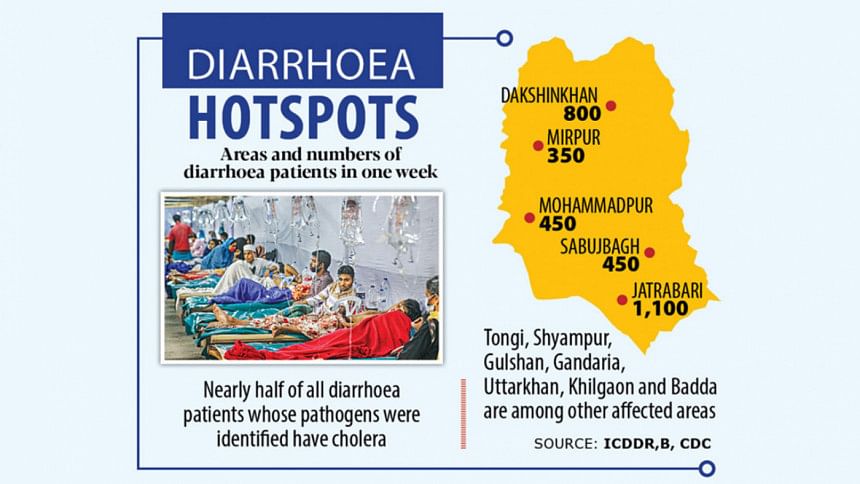Dhaka Wasa must answer for cholera outbreak

It's alarming to know that the cholera outbreak in Dhaka has already overwhelmed hospitals, particularly the one run by the International Centre for Diarrhoeal Disease Research, Bangladesh (icddr,b). The 350-bed hospital is struggling to tackle the rising number of diarrhoea patients and has had to set up tents on its premises to accommodate them. According to our report, since March 13, over a thousand patients have been visiting the hospital every day. On March 26, the number was approximately 1,200, while it was just 600 around the same time last year. While diarrhoea and cholera flare-ups are normal during this time of the year, it is the staggering number of patients that is worrying us.
Our reporters have visited many affected areas in the city and found breaches in Dhaka Wasa's supply system to be the main reason behind the outbreak. In many areas, residents are getting contaminated water through taps—often the water is greenish-brown or yellowish and smelly, which suggests cross-contamination with sewage lines. Cross-contamination may have happened due to leaks and breaches in the supply lines, or while replacing old, derelict pipes with new ones. In other water-starved areas, illegal hose pipes are used to get water directly from pumps. These pipes are often full of holes through which all kinds of germs mix with the water. This is most unacceptable.
Among the areas hit by the outbreak, Dakshinkhan and Jatrabari are the worst-affected. In 2019, water samples from Jatrabari were tested by the local government and rural development ministry, which detected the presence of both coliform and heterotrophic bacteria. Vibrio cholerae, which is causing cholera among the patients at present, is a type of the latter. We don't know what steps Wasa took to address the issue, neither the status of its project to replace old, dilapidated pipes—which are apparently causing the contamination now. Clearly, not enough has been done.
The question is, isn't it Wasa's responsibility to ensure safe water for all the residents? Why do people still have to buy drinking water or spend money to purify it? A study by the Transparency International Bangladesh (TIB) in 2019 found that 91 percent of Dhaka's population had to boil water to drink it and, in the process, burn gas worth Tk 332 crore a year. The extent of Wasa's failure is really inconceivable.
About the current cholera outbreak, we think Wasa must shoulder the responsibility instead of trying to deny it. It must look into its supply lines and fix the breaches as soon as possible. Otherwise, the outbreak might totally go out of control soon.

 For all latest news, follow The Daily Star's Google News channel.
For all latest news, follow The Daily Star's Google News channel. 



Comments